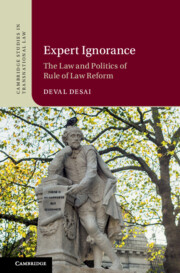To the Reader
This is an account of rule of law practitioners – their activities, beliefs, and intentions – myself included. It argues that who they are and what they do is much less certain and full of meaning than others might assert. And yet their work is no less relevant for it.
The action of this book emerges from what I have experienced over a decade as a rule of law reformer: I am an encounter with and recounter of this action. ‘I myself am the matter of my book: it is not reasonable that you should employ your leisure on a topic so frivolous and so vain.’Footnote 1
But if you wish to so employ your leisure, this book is neither apology for nor utopia from the work of these practitioners (although you might find fragments towards both). It offers an analytic account of self-denying expertise, or what I have termed expert ignorance. Expert ignorance refers to the form of expertise of experts – here, rule of law reformers – for whom it is a legitimate professional position to deny that they know anything about the object of their expertise.
Ignorant experts are neither inside nor outside their field of expertise, for one blurs into the other. And the audience for this book is thus neither this lawyer nor that critic, for one too blurs into the other. It is you, for as long as you wish. And if your wish is to speak truth to the power and hubris of global governors, this book engages you on problems of style and methods – for when some experts are neither inside nor outside that which you seek to study, how can you position yourself against them and the material, social, and discursive conditions they may represent? If your wish is to lament the democratic (or other) deficit of political legitimacy and accountability of global technocratic governance, this book commends to you a change in political emphasis – for what can be more democratic than shared conditions of ignorance between expert and lay? If your wish is to fulminate against the global juridification and depoliticisation of human activity, this book argues that ignorant experts produce the inverse – for how can experts divide the world into law and politics when they do not know what the rule of law is? And if your wish is simply to understand how expert ignorance works and the sort of ignorance it produces, the book exemplifies an approach to studying it.
Expert ignorance fundamentally destabilises the relationship between knowledge and action. The text thus moves between what Alice Rayner calls styles of ‘acting’ (rooted in the mind – the thinking subject) and ‘doing’ (rooted in the body – the doing object), stitching them together into an exemplary ‘performance’.Footnote 2 This performance reflects ignorant experts’ anxious efforts to collapse, reconfigure, and stitch together knowledge and action into a whole artefact: rule of law reform composed of actions that reformers have put in motion through their own self-negation.
This motion spans space. It takes place at a global level, moving between places where practitioners develop ideas, theories, policies, programmes, ways of speaking and arguing, and styles of writing and acting (from Malta to London to Washington, DC). It also takes place at other levels, including extremely local encounters in sub-Saharan Africa between practitioners and community members (the latter often ending up practitioners of a sort themselves). This motion spans time, too; it is embedded in different moments of experience as well as an authorial ‘now’. And it spans identity: recounted through different versions of myself, blurring the boundaries between private and professional, an emplaced observer and a global technocrat, both writer and written.
The text is thus methodologically and stylistically varied, ‘so far as respect for [academic] convention allows.’Footnote 3 The book consists of scholarly analysis, case studies, stylised facts, and fictionalised retellings. It explicitly moves and works through different genres – sociology, performance studies, history, policy analysis, international relations – to explore how its claims play out under their rubrics.
The movement in the text, as well as the recurrence of theatre and performance as both motif and analytic, is intended to commend to you a dramatic – or performance – analysis of the movement produced by expert ignorance. That is, the text understands rule of law reformers to be engaged in an aesthetic practice when they deny that they know what the rule of law is and what it looks like, even as they try to build something from that position of ignorance. Furthermore, that aesthetic practice is fundamentally embodied in the irreducible figure of the rule of law reformer. Performance, stagecraft, theatricality – these do not simply function as explanatory metaphors for ignorant experts’ development activity. They are the gravamen of their work. This text embraces that dimension of experts’ work, writing and reading it as a dramatic text.
‘You have here, reader, a book whose faith can be trusted …’Footnote 4 But in a world of expert ignorance, faith and motivation are secondary to and emerge from the moving patterns of expert action. Thus, the form of the text – its organisation and the way it moves among styles – aims to exemplify the actions it describes as well as my motivations for describing them.
1 Michel Montaigne, The Essays: A Selection, New ed., tr. M. A. Screech (Penguin Classics, 1993), p. 53 (‘To the Reader’).
2 Alice Rayner, To Act, to Do, to Perform: Drama and the Phenomenology of Action (University of Michigan Press, 1994).
3 Montaigne, Essays, p. 53.
4 Montaigne, Essays, p. 53.

